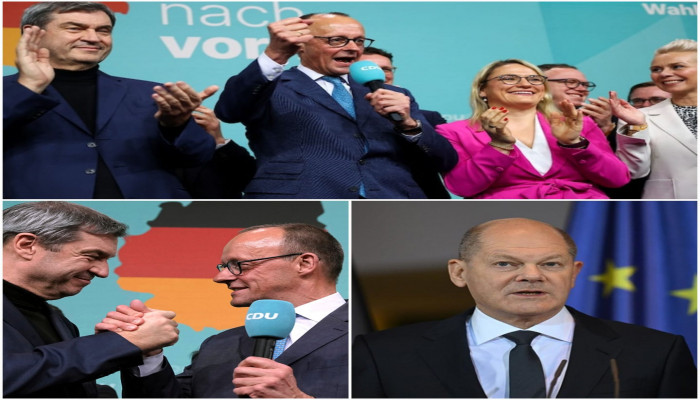Friedrich Merz set to be next German Chancellor, Olaf Scholz concedes defeat
- In Reports
- 02:07 PM, Feb 24, 2025
- Myind Staff
German Chancellor Olaf Scholz admitted his party’s defeat on Sunday. He extended his congratulations to Friedrich Merz, the conservative opposition leader after exit polls indicated a significant change in Germany’s political landscape.
"This is a bitter election result for the Social Democratic Party; it is also an electoral defeat," Scholz stated in his first speech following the vote. "Congratulations on the election result," he told Merz.
Exit polls from the ZDF public broadcaster showed that the opposition conservative CDU/CSU bloc secured 28.5 per cent of the vote. The far-right Alternative for Germany (AfD) came in second with 20 per cent, marking its best performance in a national election. Meanwhile, the Social Democrats (SPD) saw their worst result since World War II, receiving only 16.5 per cent of the vote.
The Greens garnered 12 per cent, while the Free Democratic Party (FDP) hovered around the 5 per cent threshold needed to enter parliament. The far-left Die Linke party secured 9 per cent, and the newly formed leftist party BSW, guided by Sahra Wagenknecht, acquired 5 per cent.
With these results, coalition talks are expected to be challenging. Merz, who has never held a government position, has pledged more decisive leadership and closer cooperation with allies but will have to navigate a fragmented political landscape to form a coalition.
The campaign unfolded against the backdrop of violent attacks and interventions by former U.S. President Donald Trump's administration. The political debate primarily centred on migration and the role of the AfD, a party that mainstream groups have refused to collaborate with due to Germany’s historical ties to far-right politics.
As coalition talks continue, Scholz may stay in office as a caretaker. This could delay efforts to tackle economic challenges, especially after two years of economic contraction. Germany’s dependence on exports and its security relationship with the United States add to the uncertainty.
Public opinion on migration has shifted significantly since 2015, when Germany welcomed many refugees. The AfD has taken advantage of this change, strengthening its position despite being excluded from coalition negotiations.
The election occurred after Scholz’s coalition collapsed in November due to disagreements over budget spending. The campaign focused on key issues such as migration, security, and economic policies. The AfD received notable backing from figures associated with the Trump administration, including Vice President JD Vance and billionaire Elon Musk, which drew reactions from European leaders.
The AfD’s growing influence presents challenges for governance. While the party is unlikely to join the government at this stage, its rising support could shape future elections. The outcome of this election may determine the direction of policymaking within Germany and the European Union.
Merz has proposed re-evaluating Germany’s debt brake, a constitutional rule restricting government borrowing. Supporters believe modifying this rule could enable more significant investment, a key topic in ongoing economic discussions.







Comments